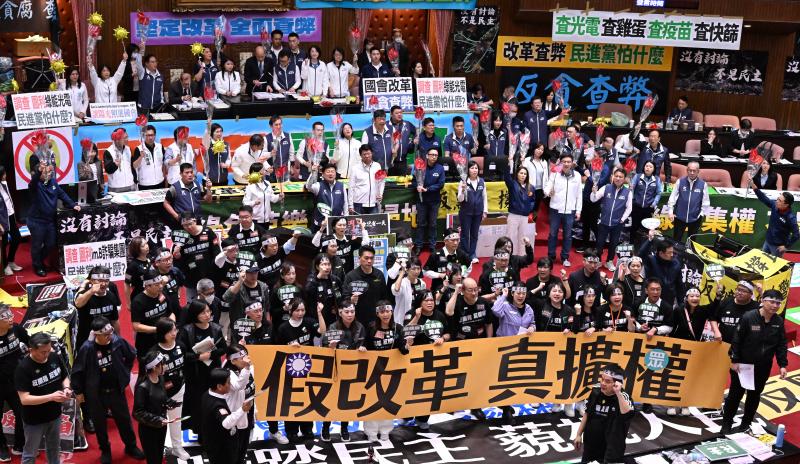President William Lai (賴清德) on Tuesday approved the Cabinet's request to return a set of contentious legislative reform bills to the legislature, which could hold a final vote on Tuesday next week at the earliest.
The changes to the Act Governing the Legislative Yuan’s Power (立法院職權行使法) and the Criminal Code were passed by opposition lawmakers voting in the majority on May 28.
The Executive Yuan on Thursday last week formally decided to return the legislation to lawmakers for reconsideration pending approval from the president, a power afforded to it under the Additional Articles of the Constitution.

Photo: Liu Hsin-de, Taipei Times
Lai at 11am on Tuesday sent the approved proposal back to the Cabinet, while the Presidential Office secretary-general notified the Legislative Yuan of the decision, office spokesperson Kuo Ya-hui (郭雅慧) said.
The president carefully considered the Cabinet’s reasoning and decided to approve its constitutionally afforded right to return the legislation, Kuo said.
He hopes all parties will carefully scrutinize the content of the bills and reach a consensus that is legal, constitutional and prioritizes national interests, Kuo added.
Article 3-2 of the Additional Articles of the Constitution stipulates that if the Executive Yuan finds a bill passed by the Legislative Yuan difficult to execute, it can within 10 days of receiving it request the legislature to reconsider the bill, provided it has the president’s approval.
The legislature is required to convene at most seven days after receiving the request and vote on whether to uphold the passage of the bill within 15 days.
More than half of all sitting legislators — or a minimum of 57 votes in the current legislature — must vote yes to uphold the bill.
If the legislature fails to reach a decision within this period, it would become invalid.
The soonest the legislature could reach a conclusion is on Tuesday next week.
Additional reporting by CNA

Taiwan has received more than US$70 million in royalties as of the end of last year from developing the F-16V jet as countries worldwide purchase or upgrade to this popular model, government and military officials said on Saturday. Taiwan funded the development of the F-16V jet and ended up the sole investor as other countries withdrew from the program. Now the F-16V is increasingly popular and countries must pay Taiwan a percentage in royalties when they purchase new F-16V aircraft or upgrade older F-16 models. The next five years are expected to be the peak for these royalties, with Taiwan potentially earning

STAY IN YOUR LANE: As the US and Israel attack Iran, the ministry has warned China not to overstep by including Taiwanese citizens in its evacuation orders The Ministry of Foreign Affairs (MOFA) yesterday rebuked a statement by China’s embassy in Israel that it would evacuate Taiwanese holders of Chinese travel documents from Israel amid the latter’s escalating conflict with Iran. Tensions have risen across the Middle East in the wake of US and Israeli airstrikes on Iran beginning Saturday. China subsequently issued an evacuation notice for its citizens. In a news release, the Chinese embassy in Israel said holders of “Taiwan compatriot permits (台胞證)” issued to Taiwanese nationals by Chinese authorities for travel to China — could register for evacuation to Egypt. In Taipei, the ministry yesterday said Taiwan

‘LIKE-MINDED PARTNER’: Tako van Popta said it would be inappropriate to delay signing the deal with Taiwan because of China, adding he would promote the issue Canadian senators have stressed Taiwan’s importance for international trade and expressed enthusiasm for ensuring the Taiwan-Canada trade cooperation framework agreement is implemented this year. Representative to Canada Harry Tseng (曾厚仁) in an interview with the Central News Agency (CNA) said he was increasingly uneasy about Ottawa’s delays in signing the agreement, especially as Ottawa has warmed toward Beijing. There are “no negotiations left. Not only [is it] initialed, we have three versions of the text ready: English, French and Mandarin,” Tseng said. “That tells you how close we are to the final signature.” Tseng said that he hoped Canadian Prime Minister Mark Carney

POSITIVE DEVELOPMENT: Japan and the US are expected to hold in-depth discussions on Taiwan-related issues during the meeting next month, Japanese sources said The holding of a Japan-US leaders’ meeting ahead of US President Donald Trump’s visit to China is positive news for Taiwan, former Japan-Taiwan Exchange Association representative Hiroyasu Izumi said yesterday. After the Liberal Democratic Party’s landslide victory in Japan’s House of Representatives election, Japanese Prime Minister Sanae Takaichi is scheduled to visit the US next month, where she is to meet with Trump ahead of the US president’s planned visit to China from March 31 to April 2 for a meeting with Chinese President Xi Jinping (習近平). Japan and the US are expected to hold in-depth discussions on Taiwan-related issues during the